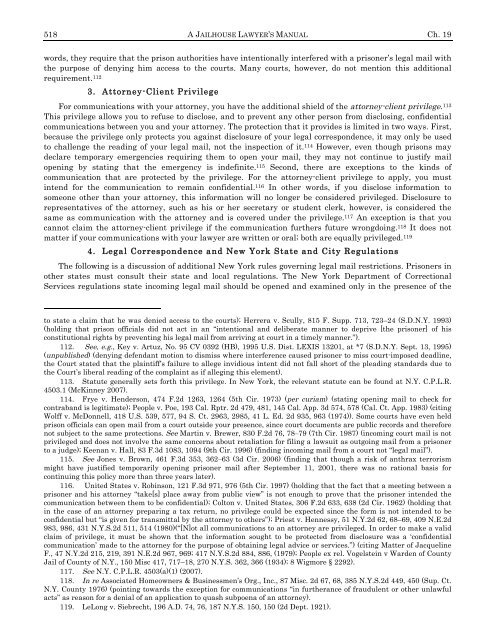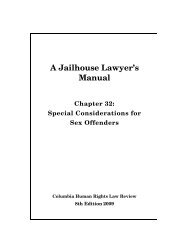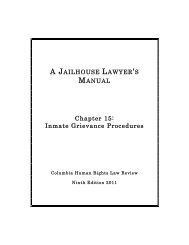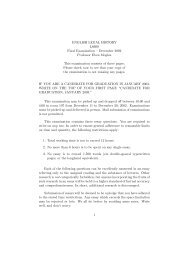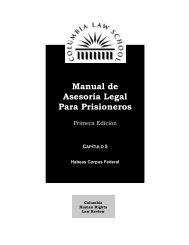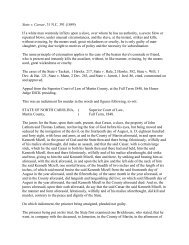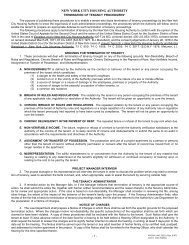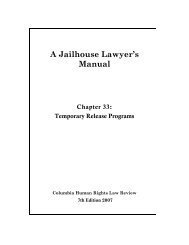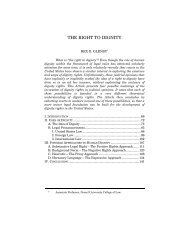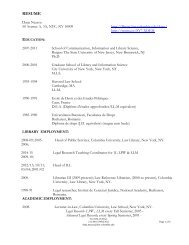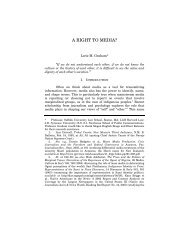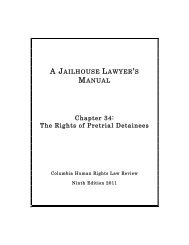Your Right to Communicate With the Outside World - Columbia Law ...
Your Right to Communicate With the Outside World - Columbia Law ...
Your Right to Communicate With the Outside World - Columbia Law ...
- No tags were found...
Create successful ePaper yourself
Turn your PDF publications into a flip-book with our unique Google optimized e-Paper software.
518 A JAILHOUSE LAWYER’S MANUAL Ch. 19words, <strong>the</strong>y require that <strong>the</strong> prison authorities have intentionally interfered with a prisoner’s legal mail with<strong>the</strong> purpose of denying him access <strong>to</strong> <strong>the</strong> courts. Many courts, however, do not mention this additionalrequirement. 1123. At<strong>to</strong>rney-Client PrivilegeFor communications with your at<strong>to</strong>rney, you have <strong>the</strong> additional shield of <strong>the</strong> at<strong>to</strong>rney-client privilege. 113This privilege allows you <strong>to</strong> refuse <strong>to</strong> disclose, and <strong>to</strong> prevent any o<strong>the</strong>r person from disclosing, confidentialcommunications between you and your at<strong>to</strong>rney. The protection that it provides is limited in two ways. First,because <strong>the</strong> privilege only protects you against disclosure of your legal correspondence, it may only be used<strong>to</strong> challenge <strong>the</strong> reading of your legal mail, not <strong>the</strong> inspection of it. 114 However, even though prisons maydeclare temporary emergencies requiring <strong>the</strong>m <strong>to</strong> open your mail, <strong>the</strong>y may not continue <strong>to</strong> justify mailopening by stating that <strong>the</strong> emergency is indefinite. 115 Second, <strong>the</strong>re are exceptions <strong>to</strong> <strong>the</strong> kinds ofcommunication that are protected by <strong>the</strong> privilege. For <strong>the</strong> at<strong>to</strong>rney-client privilege <strong>to</strong> apply, you mustintend for <strong>the</strong> communication <strong>to</strong> remain confidential. 116 In o<strong>the</strong>r words, if you disclose information <strong>to</strong>someone o<strong>the</strong>r than your at<strong>to</strong>rney, this information will no longer be considered privileged. Disclosure <strong>to</strong>representatives of <strong>the</strong> at<strong>to</strong>rney, such as his or her secretary or student clerk, however, is considered <strong>the</strong>same as communication with <strong>the</strong> at<strong>to</strong>rney and is covered under <strong>the</strong> privilege. 117 An exception is that youcannot claim <strong>the</strong> at<strong>to</strong>rney-client privilege if <strong>the</strong> communication fur<strong>the</strong>rs future wrongdoing. 118 It does notmatter if your communications with your lawyer are written or oral; both are equally privileged. 1194. Legal Correspondence and New York State and City RegulationsThe following is a discussion of additional New York rules governing legal mail restrictions. Prisoners ino<strong>the</strong>r states must consult <strong>the</strong>ir state and local regulations. The New York Department of CorrectionalServices regulations state incoming legal mail should be opened and examined only in <strong>the</strong> presence of <strong>the</strong><strong>to</strong> state a claim that he was denied access <strong>to</strong> <strong>the</strong> courts); Herrera v. Scully, 815 F. Supp. 713, 723–24 (S.D.N.Y. 1993)(holding that prison officials did not act in an “intentional and deliberate manner <strong>to</strong> deprive [<strong>the</strong> prisoner] of hisconstitutional rights by preventing his legal mail from arriving at court in a timely manner.”).112. See, e.g., Key v. Artuz, No. 95 CV 0392 (HB), 1995 U.S. Dist. LEXIS 13201, at *7 (S.D.N.Y. Sept. 13, 1995)(unpublished) (denying defendant motion <strong>to</strong> dismiss where interference caused prisoner <strong>to</strong> miss court-imposed deadline,<strong>the</strong> Court stated that <strong>the</strong> plaintiff’s failure <strong>to</strong> allege invidious intent did not fall short of <strong>the</strong> pleading standards due <strong>to</strong><strong>the</strong> Court’s liberal reading of <strong>the</strong> complaint as if alleging this element).113. Statute generally sets forth this privilege. In New York, <strong>the</strong> relevant statute can be found at N.Y. C.P.L.R.4503.1 (McKinney 2007).114. Frye v. Henderson, 474 F.2d 1263, 1264 (5th Cir. 1973) (per curiam) (stating opening mail <strong>to</strong> check forcontraband is legitimate); People v. Poe, 193 Cal. Rptr. 2d 479, 481, 145 Cal. App. 3d 574, 578 (Cal. Ct. App. 1983) (citingWolff v. McDonnell, 418 U.S. 539, 577, 94 S. Ct. 2963, 2985, 41 L. Ed. 2d 935, 963 (1974)). Some courts have even heldprison officials can open mail from a court outside your presence, since court documents are public records and <strong>the</strong>reforenot subject <strong>to</strong> <strong>the</strong> same protections. See Martin v. Brewer, 830 F.2d 76, 78–79 (7th Cir. 1987) (incoming court mail is notprivileged and does not involve <strong>the</strong> same concerns about retaliation for filing a lawsuit as outgoing mail from a prisoner<strong>to</strong> a judge); Keenan v. Hall, 83 F.3d 1083, 1094 (9th Cir. 1996) (finding incoming mail from a court not “legal mail”).115. See Jones v. Brown, 461 F.3d 353, 362–63 (3d Cir. 2006) (finding that though a risk of anthrax terrorismmight have justified temporarily opening prisoner mail after September 11, 2001, <strong>the</strong>re was no rational basis forcontinuing this policy more than three years later).116. United States v. Robinson, 121 F.3d 971, 976 (5th Cir. 1997) (holding that <strong>the</strong> fact that a meeting between aprisoner and his at<strong>to</strong>rney “take[s] place away from public view” is not enough <strong>to</strong> prove that <strong>the</strong> prisoner intended <strong>the</strong>communication between <strong>the</strong>m <strong>to</strong> be confidential); Col<strong>to</strong>n v. United States, 306 F.2d 633, 638 (2d Cir. 1962) (holding thatin <strong>the</strong> case of an at<strong>to</strong>rney preparing a tax return, no privilege could be expected since <strong>the</strong> form is not intended <strong>to</strong> beconfidential but “is given for transmittal by <strong>the</strong> at<strong>to</strong>rney <strong>to</strong> o<strong>the</strong>rs”); Priest v. Hennessy, 51 N.Y.2d 62, 68–69, 409 N.E.2d983, 986, 431 N.Y.S.2d 511, 514 (1980)(“[N]ot all communications <strong>to</strong> an at<strong>to</strong>rney are privileged. In order <strong>to</strong> make a validclaim of privilege, it must be shown that <strong>the</strong> information sought <strong>to</strong> be protected from disclosure was a ‘confidentialcommunication’ made <strong>to</strong> <strong>the</strong> at<strong>to</strong>rney for <strong>the</strong> purpose of obtaining legal advice or services.”) (citing Matter of JacquelineF., 47 N.Y.2d 215, 219, 391 N.E.2d 967, 969; 417 N.Y.S.2d 884, 886, (1979); People ex rel. Vogelstein v Warden of CountyJail of County of N.Y., 150 Misc 417, 717–18, 270 N.Y.S. 362, 366 (1934); 8 Wigmore § 2292).117. See N.Y. C.P.L.R. 4503(a)(1) (2007).118. In re Associated Homeowners & Businessmen’s Org., Inc., 87 Misc. 2d 67, 68, 385 N.Y.S.2d 449, 450 (Sup. Ct.N.Y. County 1976) (pointing <strong>to</strong>wards <strong>the</strong> exception for communications “in fur<strong>the</strong>rance of fraudulent or o<strong>the</strong>r unlawfulacts” as reason for a denial of an application <strong>to</strong> quash subpoena of an at<strong>to</strong>rney).119. LeLong v. Siebrecht, 196 A.D. 74, 76, 187 N.Y.S. 150, 150 (2d Dept. 1921).


